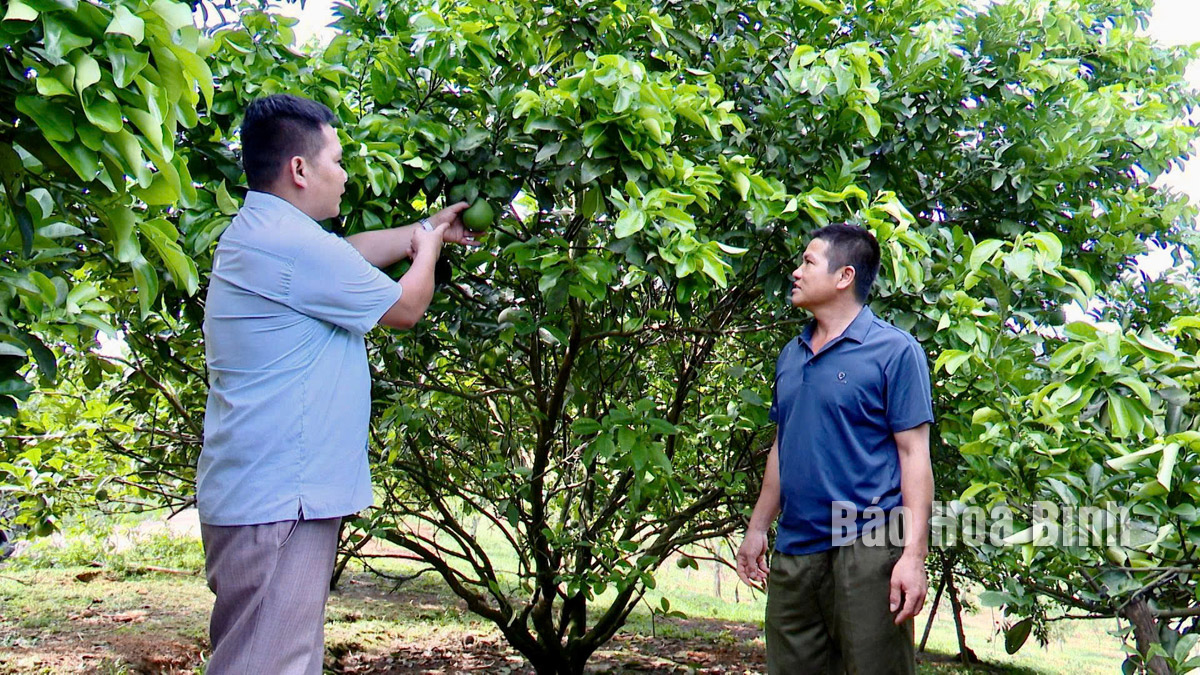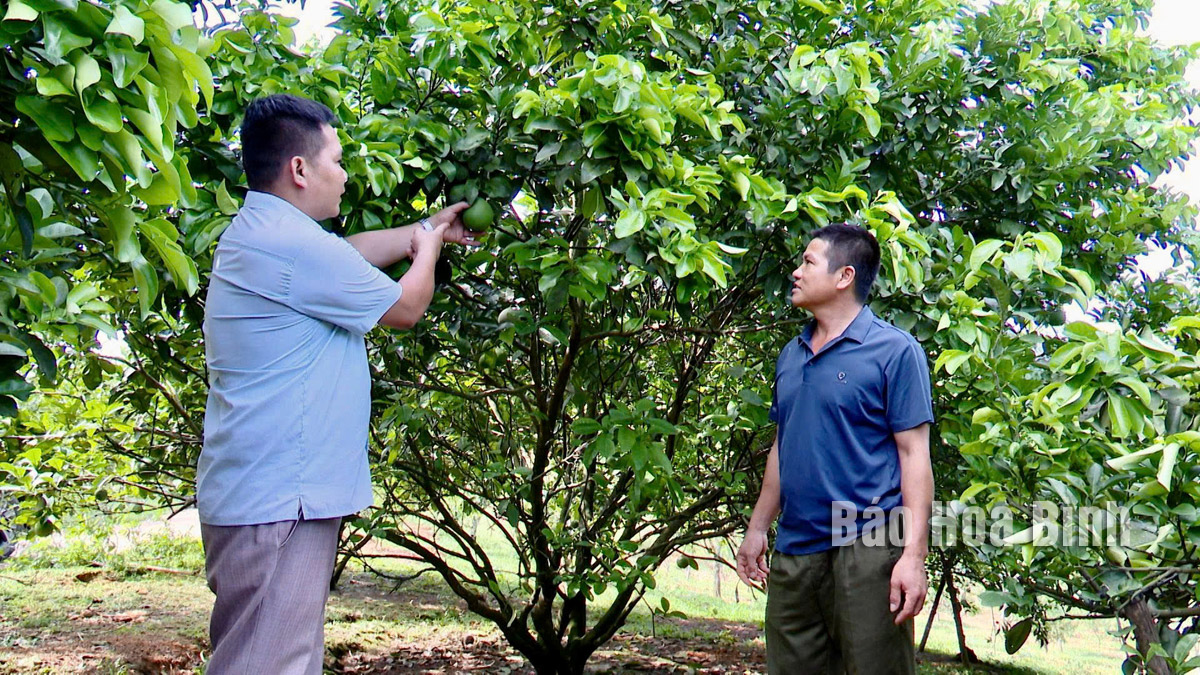
An Nghia Commune (Lạc Sơn District) is one of the communes that achieved the tha standard of the national new rural area in 2018. Entering a new development phase, the commune is now trying to meet the criteria for the advanced new rural development. With the strong political will and the public consensus, the commune is gradually overcoming the challenges to reach this goal, aiming for the sustainable development.
The model of green pomelo cultivation in An Nghia Commune (Lac Son) delivers high economic value.
The communication efforts have been identified as a key factor. The local Steering Committee for the New Rural Development has proactively implemented the diverse communication methods, such as village meetings, public loudspeakers, banners, and slogans displayed along main roads. The messaging follows the guidance of the central, provincial and district authorities, helping the residents clearly understand the program’s goals and criteria, it also also emphasizes the community’s central role. The Steering Committee has also formed the support teams and program management boards at the village level to enhance supervision, ensure timely implementation and adhere to regulations. The annual reviews are conducted to evaluate results, draw lessons and promptly resolve bottlenecks.
To date, An Nghia Commune has achieved 4 advanced criteria: electricity, housing, income and multi-dimensional poverty reduction. Specifically, 100% of the 2,005 households have access to safe and reliable electricity; 98% of the households live in the permanent or semi-permanent housses; the average income per capita has reached 70 million VND, which is above the minimum requirement; and the multi-dimensional poverty rate has dropped to 4.96%, below the allowed threshold.
However, these achievements are only an initial step. The commune has to meet 15 out of the 19 advanced criteria, including important ones such as planning, transportation, education, culture, irrigation, production organization, environment, and digital transformation. Although all commune and village roads (totaling over 19.8 km) have been paved or concreted, the transport criterion remains unmet due to the lack of the street lighting, insufficient landscaping, and incomplete hardening of alleys and in-field roads. While a master plan and management regulations have been approved, the planning criterion still falls short of certification.
Education criteria also faces challenges due to the scattered school locations and substandard facilities. Expanding classroom space remains difficult. The production and rural economic development criteria are another obstacle. Currently, the commune has only one multi-sector cooperative (Dai Nghia Cooperative) and one OCOP product, Muong Khoi fermented rice wine, certified in 2022. There are no value chain-linked production models, no products sold via e-commerce, and no designated raw material zones, which are the requirements under the advanced rural criteria. The environmental standards are also lacking, with inadequate infrastructure for solid waste collection and treatment, low rates of household waste sorting at source, and insufficient sanitation and greenery in the residential areas. The new requirements in digital transformation, food safety, and rural markets also pose major challenges.
Mr. Bui Van Nguyen, the Chairman of An Nghia People's Committee, says: "We recognize that building an advanced new rural commune is a long journey that requires determination from both the government and the people. Our greatest difficulty now is the limited resources, while the criteria are increasingly high and interconnected. However, with the solid foundation built from the previous achievements and strong public support, we believe we can gradually resolve these challenges and complete the remaining criteria”.
Looking ahead, An Nghia Commune aims to maintain its achieved criteria and prioritize completing Criterion 14 on healthcare, focusing on increasing health coverage, promoting the use of electronic medical records, and applying telemedicine. New communication methods such as theatrical performances and grassroots-level dialogues will be employed. The commune also seeks to mobilize socialized investment and maximize community resources.
The key focus areas for the next phase include mobilizing and integrating funding from government, businesses, and citizens; developing key products through sustainable processing and distribution; strengthening grassroots political systems and improving management of the rural development program; applying information technology in governance and improving citizen satisfaction.
Despite many challenges, the determination of the local authorities and the unity of the people give An Nghia confidence in achieving the advanced new rural status in the near future. The success of the program is not just measured by titles, but by the visible and meaningful improvements in the daily lives of the rural residents.
The emulation movement "Hoa Binh joining hands to build new-style rural areas” has been widely spreading, becoming a driving force that motivates the localities to renew rural landscapes and improve the material and spiritual lives of the residents. In this movement, the people play a central role-both as the main implementers and direct beneficiaries of its outcomes.
In response to the global digital revolution, Hoa Binh Newspaper is transforming itself into a modern and multi-platform media hub, blending cutting-edge technology with a restructured newsroom and a new generation of tech-savvy journalists.
Hoa Binh province’s Association of the Elderly recently held a conference to review the project on expanding the inter-generation self-help club model until 2025.
In a move to implement Resolution No. 57-NQ/TW, issued on December 22, 2024 by the Politburo, which targets breakthroughs in science-technology development, innovation, and digital transformation, the Hoa Binh provincial Department of Health has issued a plan to roll out the "Digital Literacy for All” campaign within the local health sector.



